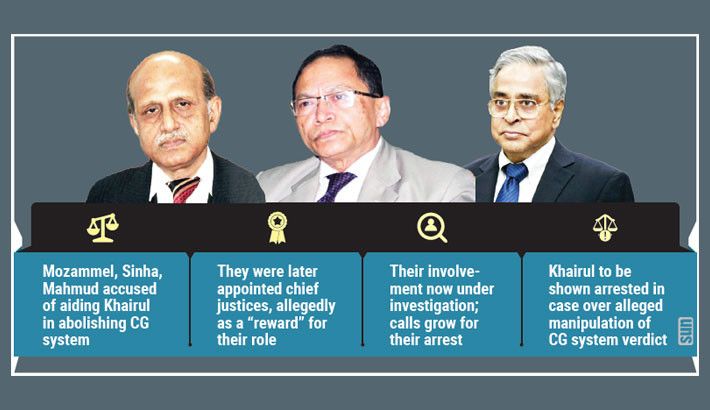Following the arrest of former Chief Justice ABM Khairul Haque, demands have been raised for legal action against three other former CJs who allegedly collaborated with him in manipulating the verdict that annulled the non-partisan caretaker government (CG) system, paving the way for one-party autocratic rule.
Legal experts and complainants allege that Justices Md Mozammel Hossain, SK Sinha and Syed Mahmud Hossain aided Khairul in altering the judgement on the 13th Amendment, facilitating the abolition of the CG system.
All three were later appointed chief justices, which is described by critics as “rewards” for their role in reshaping the judiciary to serve political ends.
Khairul, who served as the 19th CJ, was arrested on Thursday in a separate murder case filed with the Jatrabari police station.
He is also set to be shown arrested in another case filed with Shahbagh police station over alleged judicial misconduct relating to the CG verdict.
“The three former chief justices should also be arrested. Their names are in the complaint I filed,” said Advocate Muzahedul Islam Shahin, a lawyer at the Bangladesh Supreme Court who filed the case on 18 August 2024.
The case accuses Khairul and his accomplices of fraudulently rewriting the full verdict to remove key language that had originally allowed the next two general elections – the 10th and 11th parliamentary polls – to be held under a caretaker administration. This omission allegedly amounted to judicial fraud, forgery and abuse of power.
In the short order delivered on 10 May 2011, Justice Khairul and three other judges – Mozammel, Sinha, and Mahmud – agreed that the next two elections could be conducted under the CG system despite declaring the 13th Amendment unconstitutional.
However, Khairul’s final written verdict, issued 16 months after his retirement on 16 May 2012, excluded that provision without the knowledge or consent of dissenting justices.
Justice Md Abdul Wahhab Miah, Justice Nazmun Ara Sultana and Justice Md Imman Ali had dissented from the majority opinion.
Wahhab and Sultana supported keeping the caretaker system intact, while Imman Ali believed the matter should be left to Parliament.
Justice Wahhab, in his part of the final verdict, clearly wrote that the additions made by Khairul were not in line with the court’s short order.
Critics argue that the altered ruling cleared the way for one-sided elections and democratic backsliding under the Awami League.
Advocate Shahin alleges that the manipulation was done under political influence and with a promise of reward.
“Khairul changed the verdict to please Sheikh Hasina, and the other judges supported him for their own career gains,” he said.
He urged authorities to arrest all involved and pursue legal action.
Shahbagh police station Officer-in-Charge Khalid Mansur told the Daily Sun on Friday that investigations are underway.
“We are in the process of showing Khairul arrested in the case filed with our police station. The involvement of the other three former chief justices is also under investigation. Any legal action will follow based on the findings,” he said.
After retirement, Khairul was appointed chairman of the Bangladesh Law Commission and held the post throughout Hasina’s rule, unlike his predecessors, who served shorter terms.
He also enjoyed a salary and benefits equivalent to a sitting chief justice for over a decade. Khairul rose through the judiciary rapidly, controversially superseding Justices Mohammad Abdul Matin and Shah Abu Nayeem Mominur Rahman to become the CJ.
The three justices who supported Khairul’s rewritten judgment were subsequently elevated to CJ in succession.
Justice Mozammel Hossain was appointed the 20th CJ on 11 May 2011, superseding senior-most judge Justice Nayeem, who resigned in protest the next day – a rare public rebuke of judicial appointments.
After Mozammel’s retirement, SK Sinha took office as the 21st CJ. Following Sinha’s forced exit, Syed Mahmud Hossain was named the 22nd CJ in 2018, again superseding Justice Wahhab Miah, who also resigned on the day of the appointment.
In contrast, the three judges who had dissented from Khairul’s opinion were denied promotion to the top post.
Justice Wahhab only briefly served as acting CJ. Justice Nazmun Ara Sultana, the first woman in the Appellate Division and Justice Imman Ali, who also dissented, never became CJ.



